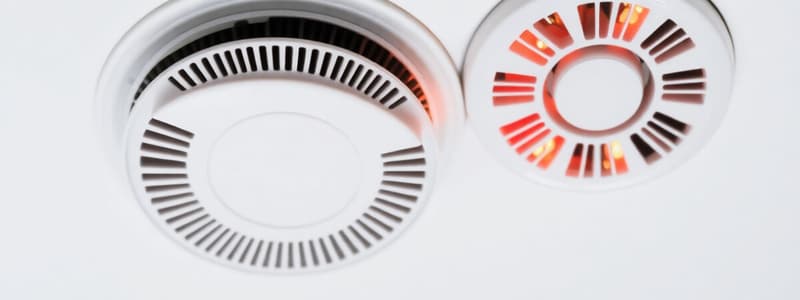Podcast
Questions and Answers
In an industrial facility known for rapid-onset fires, but where workers are often welding, which fire detection method balances sensitivity and minimizing false alarms?
In an industrial facility known for rapid-onset fires, but where workers are often welding, which fire detection method balances sensitivity and minimizing false alarms?
- Implementing flame detectors with smoke detectors as a secondary measure. (correct)
- Installing only heat detectors to avoid welding fume interference.
- Relying solely on gas detectors to identify combustible leaks.
- Using only smoke detectors, with frequent maintenance to reduce false alarms.
A home has a history of small kitchen fires caused by unattended cooking. Considering common causes and potential hazards, what would be the MOST appropriate fire detection strategy?
A home has a history of small kitchen fires caused by unattended cooking. Considering common causes and potential hazards, what would be the MOST appropriate fire detection strategy?
- Install flame detectors near the stove and oven.
- Install gas detectors near the gas lines and appliances.
- Install smoke detectors throughout the entire house, including the kitchen.
- Install heat detectors in the kitchen and smoke detectors in other areas. (correct)
A storage warehouse contains a variety of materials, including flammable liquids, paper products, and textiles. What fire detection system offers the broadest protection?
A storage warehouse contains a variety of materials, including flammable liquids, paper products, and textiles. What fire detection system offers the broadest protection?
- Relying solely on heat detectors due to the diverse range of materials.
- Installing only flame detectors to quickly identify liquid fires.
- Installing only gas detectors to detect leaks from flammable liquids.
- Using a combination of smoke, heat, and flame detectors. (correct)
In a commercial parking garage, what type of detector is BEST for detecting fires caused by vehicle malfunctions while minimizing false alarms from exhaust fumes?
In a commercial parking garage, what type of detector is BEST for detecting fires caused by vehicle malfunctions while minimizing false alarms from exhaust fumes?
How should a fire detection system be configured inside a chemical plant that handles highly flammable solvents and is prone to sudden leaks?
How should a fire detection system be configured inside a chemical plant that handles highly flammable solvents and is prone to sudden leaks?
Flashcards
Smoke Detectors
Smoke Detectors
Sense airborne combustion particles, effective for smoldering fires.
Heat Detectors
Heat Detectors
Respond to high heat or quick temperature rises; useful where smoke detectors might trigger false alarms.
Flame Detectors
Flame Detectors
Detect UV or infrared radiation given off by flames, especially where fires start fast.
Gas Detectors
Gas Detectors
Signup and view all the flashcards
Detector Placement
Detector Placement
Signup and view all the flashcards
Study Notes
- Detection devices are the first line of defense, identifying fire, smoke, heat, or hazardous gases, before situations escalate.
Smoke Detectors
- Smoke detectors sense airborne combustion particles.
- They are effective detecting smoldering fires that produce significant smoke but little heat.
- They are commonly used in residential, commercial, and industrial settings.
Heat Detectors
- Heat detectors respond to elevated temperatures or rapid temperature increases.
- They are useful in environments where smoke detectors may trigger false alarms.
- These environments include kitchens or garages where dust, steam, or cooking fumes are common.
Flame Detectors
- Flame detectors sense infrared or ultraviolet radiation emitted by open flames.
- They are highly effective in areas where fires may develop rapidly with little initial smoke.
- These areas include chemical plants or fuel storage facilities.
Gas Detectors
- Gas detectors monitor the air for combustible gases or dangerous byproducts of combustion, such as carbon monoxide.
- They are critical in enclosed spaces where gas leaks or incomplete combustion can create hazardous conditions.
Choosing a Detector
- Choosing the appropriate detector for a specific environment is essential.
- This maximizes fire detection efficiency while minimizing false alarms.
- A smoke detector in a location prone to dust, steam, or cooking smoke can lead to frequent false alarms.
- A heat detector may not provide sufficient early warning in areas where smoldering fires are a risk.
- Flame detectors are highly effective for fast-burning fires.
- Flame detectors may not detect smoldering fires as quickly as smoke detectors.
Studying That Suits You
Use AI to generate personalized quizzes and flashcards to suit your learning preferences.




